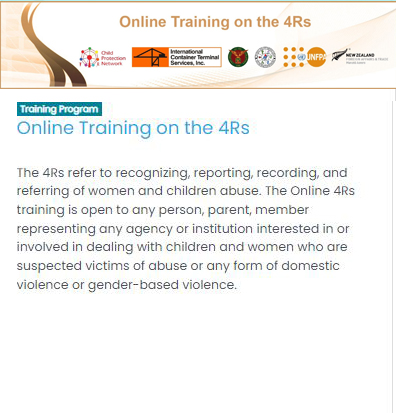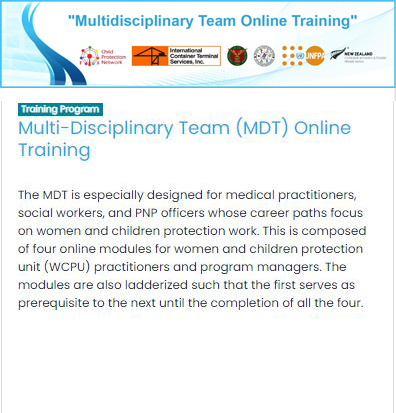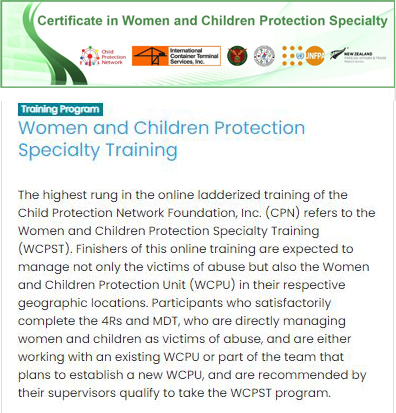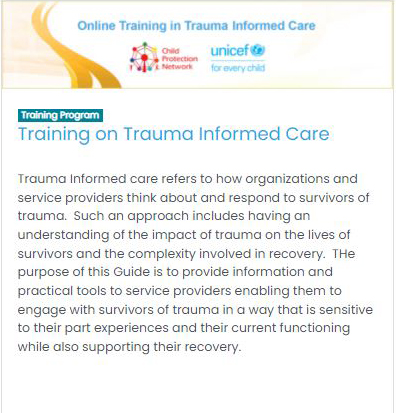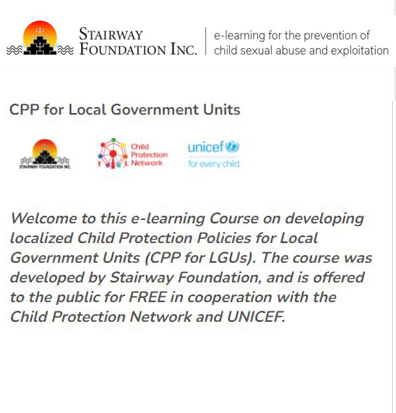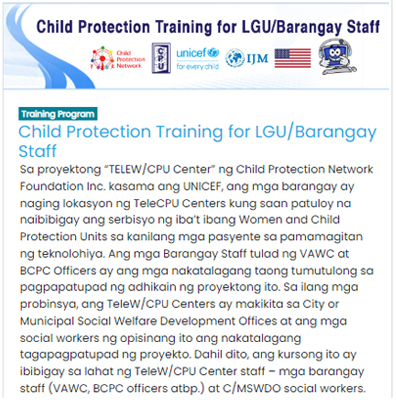Training & CPD Programs
Online Training Programs
Online Training on Multidisciplinary Team Training on Women and Children Protection
Schedules
- Batch 6: May 7 – June 27, 2024
- Batch 7: October 21 – December 12, 2024
Online Training on Certificate on Women and Children Protection Specialty
Schedules
- Batch 5: February 6 – March 27, 2024
- Batch 6: August 6 – September 26, 2024
Navigating the Women and Children Protection Online Learning (WCPOL)
The Online Training on the 4Rs, MDT, and CWCPS is a project of the CPN together with its partner agencies namely the United Nations Population Fund (UNFPA), University of the Philippines Manila through the National Teacher Training Center for the Health Professions (NTTCHP) and the Information Management Service (IMS), and the International Container Terminal Services, Foundation, Inc (ICTSI). Resource persons include faculty members and practitioners in Pediatrics, Social Work, Law, Psychiatry, Psychology, and other related fields directly handling children and women who are victims of all forms of domestic violence. Working together with CPN in this training are various government, non-government, and civic organizations that make them ready resource and contacts for referrals and appropriate actions that participants may need to consult in the course of the training.
PGH-CPU Training Programs
Discipline Specific Curricula
The PGH CPU successfully integrated Child Abuse in the undergraduate medical curriculum, residency and post-residency training programs of Pediatrics and Psychiatry of the Philippine General Hospital.
Medical Curriculum
- Child Abuse is included in Art of Medicine Curriculum for 1st year medical students at the UP College of Medicine and integrated in other organ systems at higher year levels
- Child Abuse elective for 4th year medical students at the UP College of Medicine
- Child Abuse was incorporated in the curriculum in all medical school-members of the Association of Philippine Medical Colleges (APMC) in 1999
Pediatric Residency Curriculum
- Trainor’s Training on the “3R’s of Child Abuse” for pediatricians across all regions with the Philippine Pediatric Society in 1997
- Required rotation for PGH Pediatric Residents in their second year since 2000
Fellowship Training Curriculum
- Ambulatory Pediatrics Fellowship graduates also fulfill requirements to become Child Protection Specialists
- Child Psychiatry Fellowship: first year of training is devoted mainly to seeing patients at the Child Protection Unit.
Continuing Education Opportunities
Competency Enhancement Training (CET) for Family Court and Single Sala Judges and Court Personnel Handling Child Sexual Abuse and Commercial Sexual Exploitation Cases
A training program run by the Philippine Judicial Academy of the Supreme Court of the Philippines and the Child Protection Unit Network. Participants in this 3-day workshop are judges, prosecutors, public attorneys, clerks of court, court social workers, and court interpreters. The training makes use of multiple learning strategies e.g., trigger videos, small group discussions, lectures, role-playing.
The training aims to increase the sensitivity and awareness on child sexual abuse and commercial sexual exploitation cases and improve the handling of child victims developed as an evaluation tool of the training.
Child Forensic Interview Training of Investigators of the National Bureau of Investigation
The UP Manila Child Protection Unit with the National Bureau of Investigation Violence Against Women and Children Division train NBI investigators how to interview children in suspected abuse cases. The trainees learn about child development, the language of the child and the child forensic interview model that has been adapted for use in the Philippines. A major part of the training is the practicum where the trainees conduct the interview and constructive feedback is utilized to build their skills.
Preliminary Training for Law Enforcers on Anti-Trafficking in Persons
A project of the Philippine National Police in partnership with UNICEF and the Child Protection Network. Police investigators learn how to effectively respond to cases of trafficking in persons ensuring a gender-sensitive and child-friendly procedure. The training includes lectures, a practicum on rescue operations, arrest of suspected traffickers, and interview of the child. Eight cities in Luzon, Visayas, and Mindanao were the training venues.



